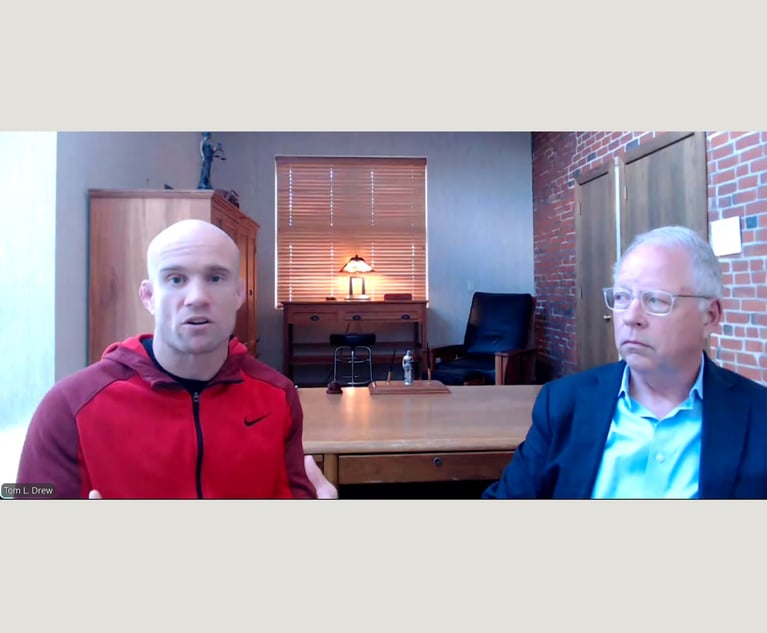Daily Dicta: O'Melveny and Hogan Rack Up Pro Bono Wins With Landmark Rulings
Pro bono teams from O'Melveny & Myers and Hogan Lovells achieved remarkable wins, mounting successful constitutional challenges in cases dealing with abortion restrictions and death row prisoners' rights.
May 09, 2019 at 11:41 AM
5 minute read
 As far as I'm concerned, all pro bono work—win or lose in matters large or small—is on the side of angels.
As far as I'm concerned, all pro bono work—win or lose in matters large or small—is on the side of angels.
But in the last few days, pro bono teams from O'Melveny & Myers and Hogan Lovells achieved remarkable wins, mounting successful constitutional challenges in cases dealing with abortion restrictions and death row prisoners' rights.
O'Melveny's Sean Trainor, Leah Godesky and Nathaniel Asher worked with the Center for Reproductive Rights, Planned Parenthood Federation of America, and local counsel the ACLU of Virginia to win a landmark decision in the Eastern District of Virginia.
On Monday, U.S. District Judge Henry Hudson found that a Virginia law mandating first trimester abortions can only be performed by physicians was unduly burdensome and therefore unconstitutional.
The law was passed in 1975, but the state of abortion care has changed dramatically since then.
Hudson ruled that first trimester abortions, which are now often induced via medication, “do not require the onsite presence of a licensed physician” and that services could be provided by qualified medical professionals such as nurse practitioners or physician's assistants.
According to Planned Parenthood lawyer Alice Clapman, it's the first time any federal judge in the nation has made such a finding.
To be clear, Hudson is not some wild-eyed liberal. Described as “staunchly conservative,” he was appointed to the bench by George W. Bush and made headlines in 2010 when he ruled that the individual mandate of Obamacare was unconstitutional.
His ruling in the abortion case, captioned Falls Church Healthcare Center v. Oliver, has significance outside of Virginia—33 other states have similar “physician only” laws, and challenges are pending in Maine, Wisconsin, Mississippi, Arizona, Kansas, Montana and Louisiana.
 “For a number of years, we've been trying to fight off new restrictions that make access worse or living with restrictions,” Clapman said. The decision “is really important because it shows we can actually think about what historically have been big barriers and target those restrictions.”
“For a number of years, we've been trying to fight off new restrictions that make access worse or living with restrictions,” Clapman said. The decision “is really important because it shows we can actually think about what historically have been big barriers and target those restrictions.”
In an interview, O'Melveny's Asher and Godesky said the firm has a long-standing relationship with the Center for Reproductive Rights and Planned Parenthood.
Both are seasoned litigators with wide-ranging commercial practices. Did either worry that taking on such a potentially controversial representation could impact, for example, how prospective clients might view them? (A Gallup poll last year found the country is evenly divided over abortion, with 48 percent of Americans personally identifying as pro-choice, and 48 percent pro-life.)
“I haven't thought about it before,” Asher said simply.
Godesky added, “If you look at O'Melveny's pro bono practice, it spans the spectrum,” she said. “Attorneys at the firm … are passionate about different things. I feel passionately about this.”
The case isn't over. While Hudson on summary judgment sided with the plaintiffs on the first trimester question, he greenlighted several other questions for trial on May 20. These include a constitutional challenge to Virginia laws that limit second-trimester abortions to hospital settings, leaving only two providers in the Commonwealth.
The plaintiffs are also challenging a Virginia law that imposes a 24-hour waiting period between when a patient must have an ultrasound and certain specified information, and when she may actually have a procedure. They also object to Virginia's statutory and regulatory scheme through which abortion clinics are licensed, and to “warrantless inspections” by the Virginia Department of Health, which they claim violate the Fourth Amendment.
The bench trial is expected to last about two weeks.
The first trimester abortion restriction wasn't the only Virginia policy deemed unconstitutional in the past week.
A Hogan Lovells team that included Cate Stetson, Kathryn Marshall Ali, Yuri Fuchs, Elizabeth Lockwood, David Maxwell, and Ryan Stephenson prevailed before the U.S. Court of Appeals for the Fourth Circuit on May 3. The appeals court affirmed a lower court decision that conditions of confinement on Virginia's death row violated the Eighth Amendment.
Prisoners at Virginia's Sussex I State Prison death row have been held in 71-square-foot cells—about half the size of a parking spot—furnished with a bed, a small desk and a commode/sink. Each cell has a window that's 5 inches high by 41.5 inches long, covered in heavy mesh. The door is solid steel with a slot for a tray.
And that's where they stayed, except for one hour outside five days a week in an 8 by 20 foot cage and three 10-minute showers a week.
“The challenged conditions of confinement on Virginia's death row—under which plaintiffs spent, for years, between 23 and 24 hours a day 'alone, in a small .. . cell' with 'no access to congregate religious, educational, or social programming'—pose a 'substantial risk' of serious psychological and emotional harm,” the divided panel held.
Stetson called the decision a landmark. “The court was right to find that the severe isolation to which our clients were subjected for years on end put them at a substantial risk of severe psychological and emotional harm, and violated their right to be free from cruel and unusual punishment,” she said.
This content has been archived. It is available through our partners, LexisNexis® and Bloomberg Law.
To view this content, please continue to their sites.
Not a Lexis Subscriber?
Subscribe Now
Not a Bloomberg Law Subscriber?
Subscribe Now
NOT FOR REPRINT
© 2024 ALM Global, LLC, All Rights Reserved. Request academic re-use from www.copyright.com. All other uses, submit a request to [email protected]. For more information visit Asset & Logo Licensing.
You Might Like
View All

Helping Lawyers Move Away from ‘Grinding’ and Toward a ‘Flow’

Why Litigation Demand Might Break Firms’ Boom-and-Bust Cycle
Trending Stories
- 1Daniel Habib to Serve as Next Attorney-in-Charge of NY Federal Defender Appeals Unit
- 2Protecting Attorney-Client Privilege in the Modern Age of Communications
- 3High-Profile Sidley M&A Partner Heads to Covington
- 4Stars and Gripes: Firms Need a 'Superstar Culture' to Crack the U.S. Market
- 5BCLP Exploring Merger Prospects as Profitability Lags, Partnership Shrinks
Who Got The Work
Michael G. Bongiorno, Andrew Scott Dulberg and Elizabeth E. Driscoll from Wilmer Cutler Pickering Hale and Dorr have stepped in to represent Symbotic Inc., an A.I.-enabled technology platform that focuses on increasing supply chain efficiency, and other defendants in a pending shareholder derivative lawsuit. The case, filed Oct. 2 in Massachusetts District Court by the Brown Law Firm on behalf of Stephen Austen, accuses certain officers and directors of misleading investors in regard to Symbotic's potential for margin growth by failing to disclose that the company was not equipped to timely deploy its systems or manage expenses through project delays. The case, assigned to U.S. District Judge Nathaniel M. Gorton, is 1:24-cv-12522, Austen v. Cohen et al.
Who Got The Work
Edmund Polubinski and Marie Killmond of Davis Polk & Wardwell have entered appearances for data platform software development company MongoDB and other defendants in a pending shareholder derivative lawsuit. The action, filed Oct. 7 in New York Southern District Court by the Brown Law Firm, accuses the company's directors and/or officers of falsely expressing confidence in the company’s restructuring of its sales incentive plan and downplaying the severity of decreases in its upfront commitments. The case is 1:24-cv-07594, Roy v. Ittycheria et al.
Who Got The Work
Amy O. Bruchs and Kurt F. Ellison of Michael Best & Friedrich have entered appearances for Epic Systems Corp. in a pending employment discrimination lawsuit. The suit was filed Sept. 7 in Wisconsin Western District Court by Levine Eisberner LLC and Siri & Glimstad on behalf of a project manager who claims that he was wrongfully terminated after applying for a religious exemption to the defendant's COVID-19 vaccine mandate. The case, assigned to U.S. Magistrate Judge Anita Marie Boor, is 3:24-cv-00630, Secker, Nathan v. Epic Systems Corporation.
Who Got The Work
David X. Sullivan, Thomas J. Finn and Gregory A. Hall from McCarter & English have entered appearances for Sunrun Installation Services in a pending civil rights lawsuit. The complaint was filed Sept. 4 in Connecticut District Court by attorney Robert M. Berke on behalf of former employee George Edward Steins, who was arrested and charged with employing an unregistered home improvement salesperson. The complaint alleges that had Sunrun informed the Connecticut Department of Consumer Protection that the plaintiff's employment had ended in 2017 and that he no longer held Sunrun's home improvement contractor license, he would not have been hit with charges, which were dismissed in May 2024. The case, assigned to U.S. District Judge Jeffrey A. Meyer, is 3:24-cv-01423, Steins v. Sunrun, Inc. et al.
Who Got The Work
Greenberg Traurig shareholder Joshua L. Raskin has entered an appearance for boohoo.com UK Ltd. in a pending patent infringement lawsuit. The suit, filed Sept. 3 in Texas Eastern District Court by Rozier Hardt McDonough on behalf of Alto Dynamics, asserts five patents related to an online shopping platform. The case, assigned to U.S. District Judge Rodney Gilstrap, is 2:24-cv-00719, Alto Dynamics, LLC v. boohoo.com UK Limited.
Featured Firms
Law Offices of Gary Martin Hays & Associates, P.C.
(470) 294-1674
Law Offices of Mark E. Salomone
(857) 444-6468
Smith & Hassler
(713) 739-1250







